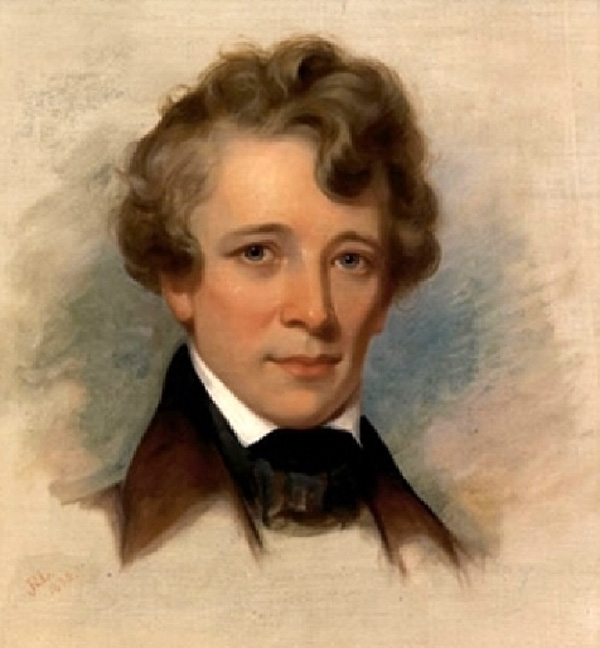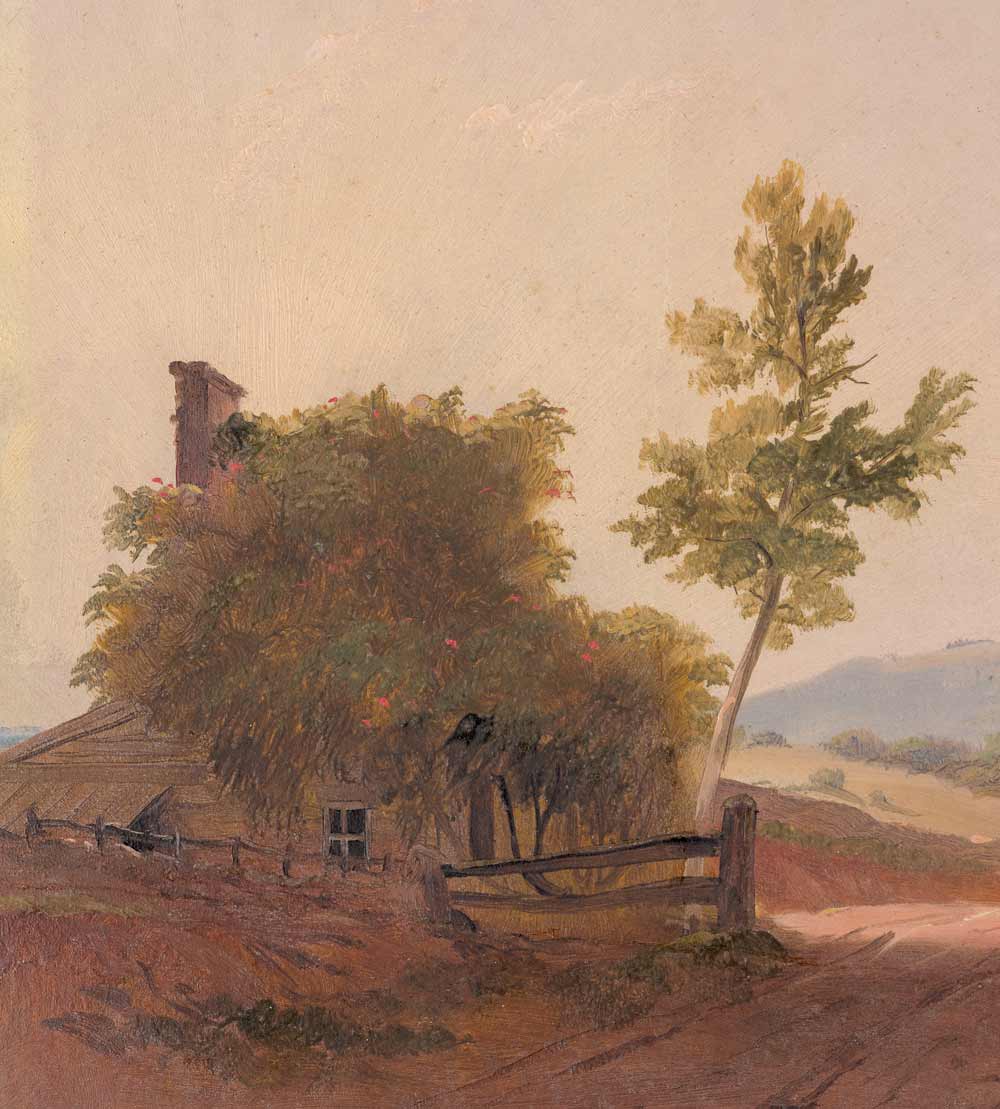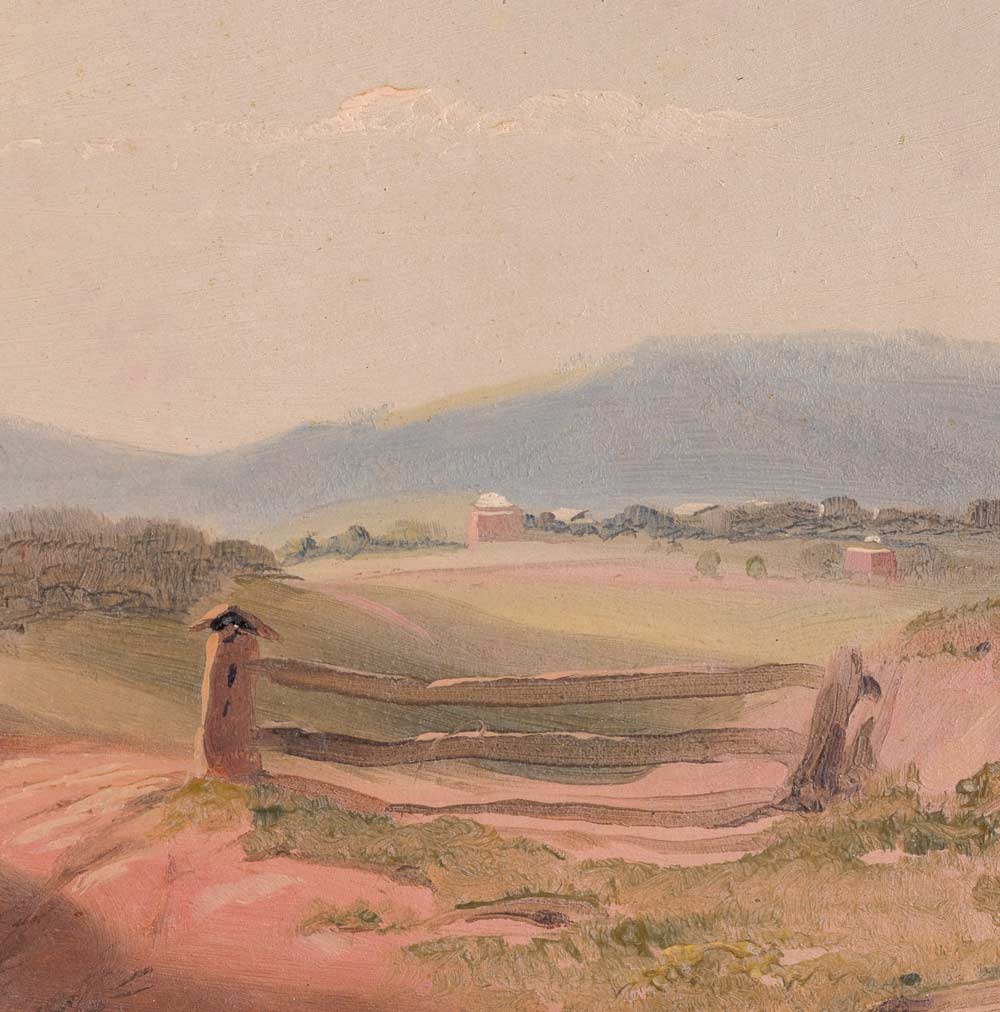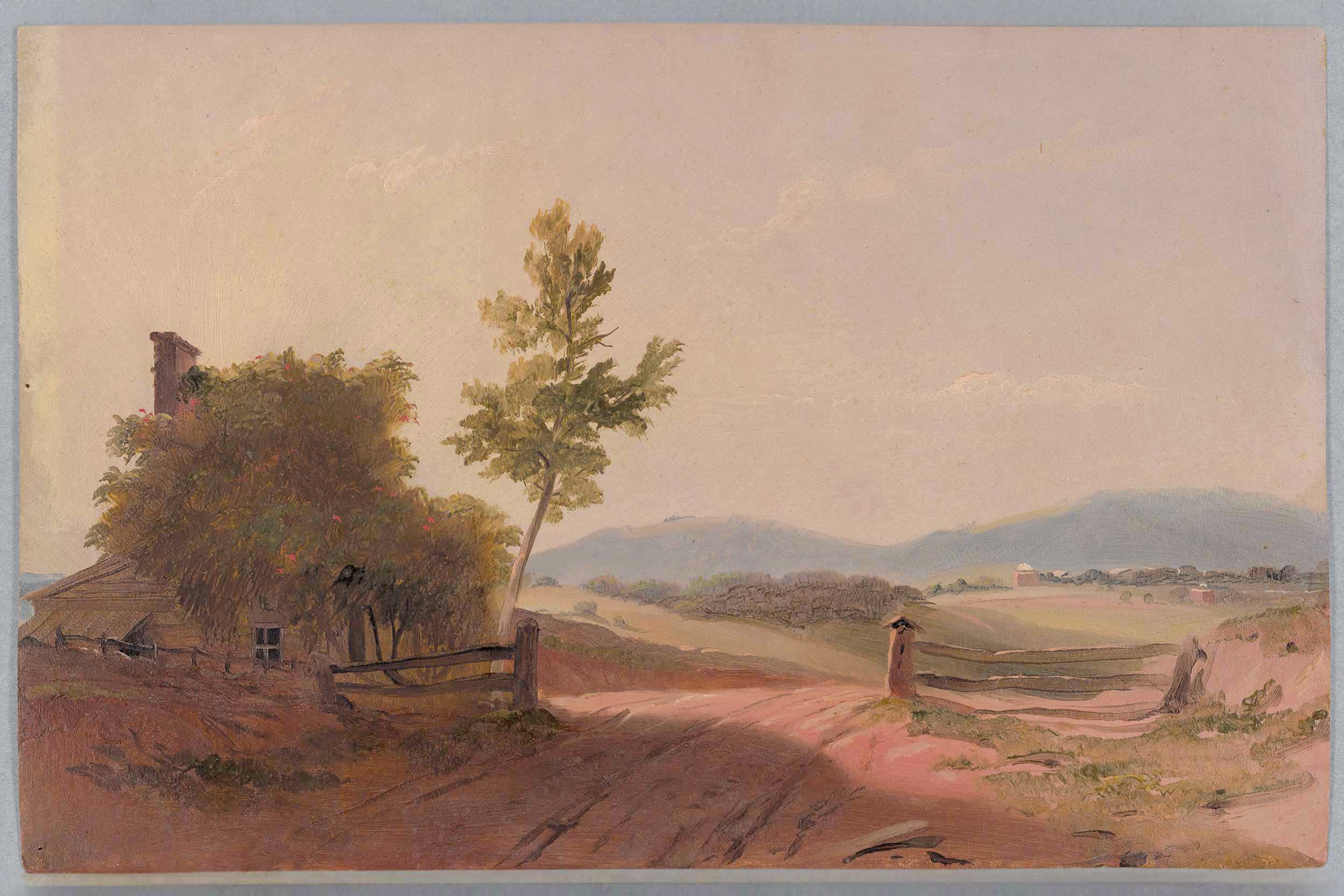Visitors can see “University of Virginia From The Toll Gate” at the Albert and Shirley Small Special Collections Library through Nov. 5. (Painting by Russell Smith)
In June 1844, landscape painter Russell Smith traveled for hours from Philadelphia to Virginia on a hot, dusty train to meet up with geologist William Barton Rogers, a professor of natural philosophy at the University of Virginia.
Smith sweated through that train ride to join Rogers to work as an illustrator for the next phase of the Geological Survey of Virginia, which studied and mapped the commonwealth’s mineral resources. What emerged from that friendship is the subject of a new exhibition now open in the First Floor Gallery of UVA’s Albert and Shirley Small Special Collections Library.
“Out of the Drawer & On the Wall: Russell Smith’s University of Virginia From the Toll Gate” sheds new light on a painting by Smith that captures the Academical Village from a unique vantage point.
Garth Anderson, a facilities historian in UVA Facilities Management’s Geospatial Engineering Services, curated the exhibition. Anderson said he found out about Russell Smith’s “University of Virginia From the Toll Gate” painting, long held but rarely seen in the Library’s collections, on a tip from Stephen Thompson, then a principal investigator at Rivanna Archaeology.

The artist Russell Smith was an illustrator for the Geological Survey of Virginia. (Painting by James Reid Lambdin)
“I wasn’t too sure what the work was going to be – whether it was a photograph of a painting or what,” Anderson said. “And lo and behold, it was the real painting – and it was something totally different, something that if it had been out and around, would have been noted before.”
Smith’s painting captures the natural beauty of the Blue Ridge Mountains, with a toll gate and rustic house in the foreground. Far off in the hazy distance, just beneath the mountains, the dome of the Rotunda is in view. “I took some photographs of [the painting] and showed it to a few people, but nobody recognized that view,” Anderson said. “It was looking at the University in a new way.”
The University as ‘Pure Landscape’
Smith, a Scottish-born painter who emigrated to Pennsylvania at a young age, made the acquaintance of artists like Rembrandt Peale and John Sartain in Philadelphia. He devoted much of his time to landscape painting in the picturesque style – “an aesthetic ideal that, in the words of influential travel writer and artist Reverend William Gilpin, highlighted ‘that peculiar kind of beauty which is agreeable in a picture,’” according to the exhibition text.
To support his travels to paint landscapes, Smith worked as an illustrator for a state-funded geological expedition in Pennsylvania. That’s how Smith met UVA’s geologist William Barton Rogers and came to join him in June 1844 to illustrate aspects of the Geological Survey of Virginia.

Though Smith earned a living as a geographical illustrator, his passion was landscape painting. (Painting by Russell Smith)
Smith made notes of his trip to Virginia in a brown leather-bound journal, which is held in the archives of the Smithsonian Institution. Anderson “made a pilgrimage” there, researching and documenting the journal entries to capture a clear picture of Smith’s travels in Charlottesville. Many of those entries are highlighted in the exhibition and show that inspiration for his toll gate painting came on Smith’s first walk with Rogers to a site on the Rockfish Gap Turnpike overlooking the Blue Ridge Mountains:
“Shortly after arriving at the University Mr. Rogers took me out a few miles west. The sun was setting and I was forcibly struck with superior picturesque beauty of the Blue Ridge to any of the Penna. Mountains. Its elevation also appears greater and the jutting spurs that run out to the east with the gently scooped valley give it a most charming effect.”
Smith returned to the site [which today is the Old Ivy Road entrance to the Miller Center] to determine the best time of day to compose a sketch. On July 4, he wrote:
“Walked out two miles after breakfast to the West. Made those sketches and retouched them before dinner. I find the grey cards do not answer so well for colour as for light shading with the pencil being afterwards set with water and a few lights put on.
“The subject of one of these sketches – a toll gate is fine for light and shade. The small house is covered entirely with a trumpet vine very dark and opposing the light which is behind.”
For the exhibition, Anderson tracked down Smith’s original sketch of the toll gate, which is held at the Library of Virginia. Comparing the sketch to the final painting, Anderson spotted differences in the works. As he wrote in the exhibition copy, “At first glance, Smith’s initial sketch and final painting are very similar. However, upon closer review, you notice differences in the sizes of the Rotunda, Monticello, and Montalto relative to the tollhouse in the foreground as well as the addition of a vast swath of greenspace.” These differences, he said, show Smith’s ability to “compose and manipulate the natural landscapes he observed into picturesque forms.”

Admirers of the Rotunda today typically only see it from University Avenue or the Lawn. This view is roughly from what is now Old Ivy Road. (Painting by Russell Smith)
Anderson, who has worked for UVA for 39 years, has an academic background in biomedical science, but has spent much of his career creating a database for all UVA-related architectural and engineering drawings held by Facilities Management. He digitized the collection, and researched the architects who began a major expansion of the Academical Village, starting with McKim, Mead, & White, as well as those who approved those plans, leading to extensive work in Special Collections. He contributed research to Richard Guy Wilson and Sara Butler’s “The Campus Guide: University of Virginia,” a seminal guide to the history and architecture of UVA, as well as to a major 2010 University Library exhibition, “From Village to Grounds: Architecture After Jefferson at the University of Virginia,” part of the UVA’s celebration of the centennial of Carr’s Hill.
As for “Out of the Drawer & On the Wall,” Anderson hopes viewers will come away with a new, somewhat idealized view of UVA, one that is vastly different from the tidy Lawn. “The University can look beautiful in the landscape,” he said. “To me, that’s the really the charm of it; it’s such a pure landscape. I love that.”
“Out of the Drawer & On the Wall: Russell Smith’s University of Virginia From the Toll Gate” is on view through Nov. 5 in the First Floor Gallery of the Harrison Institute and Albert and Shirley Small Special Collections Library.









